Unit 3 Environmental Protection Learning About Language 课件(共32张,内嵌视频)-高中英语人教版(2019)选择性必修第三册
文档属性
| 名称 | Unit 3 Environmental Protection Learning About Language 课件(共32张,内嵌视频)-高中英语人教版(2019)选择性必修第三册 | 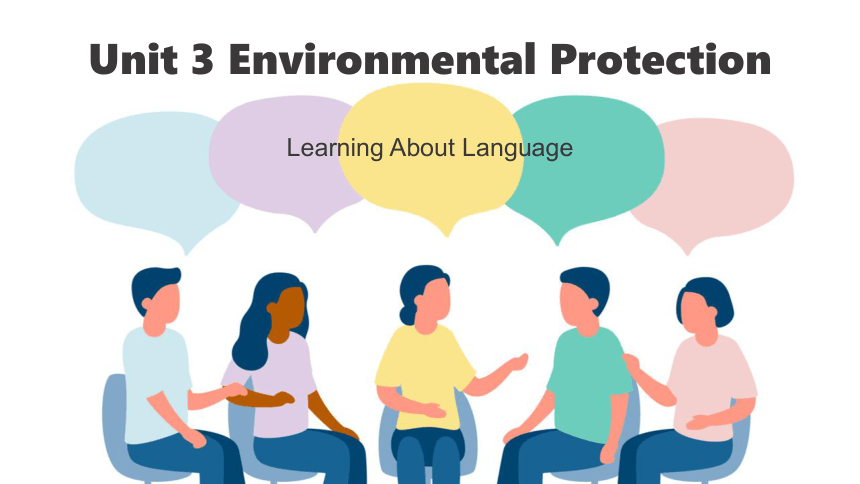 | |
| 格式 | pptx | ||
| 文件大小 | 32.1MB | ||
| 资源类型 | 教案 | ||
| 版本资源 | 人教版(2019) | ||
| 科目 | 英语 | ||
| 更新时间 | 2025-04-02 21:07:56 | ||
图片预览

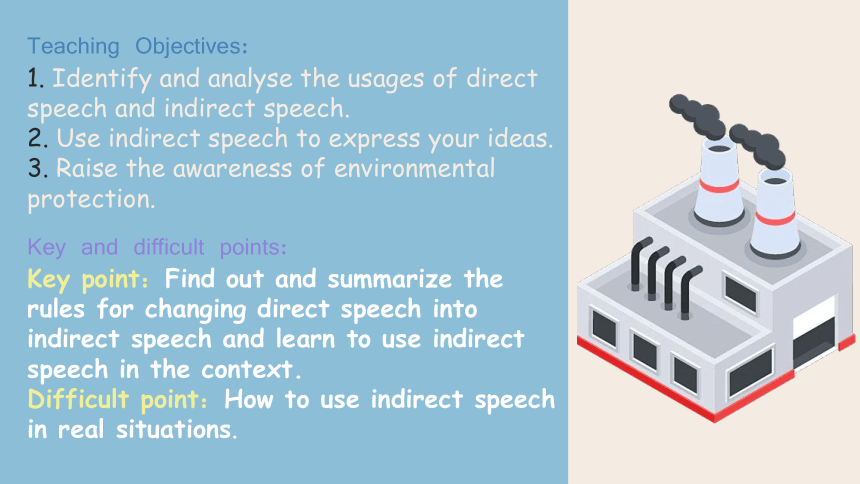


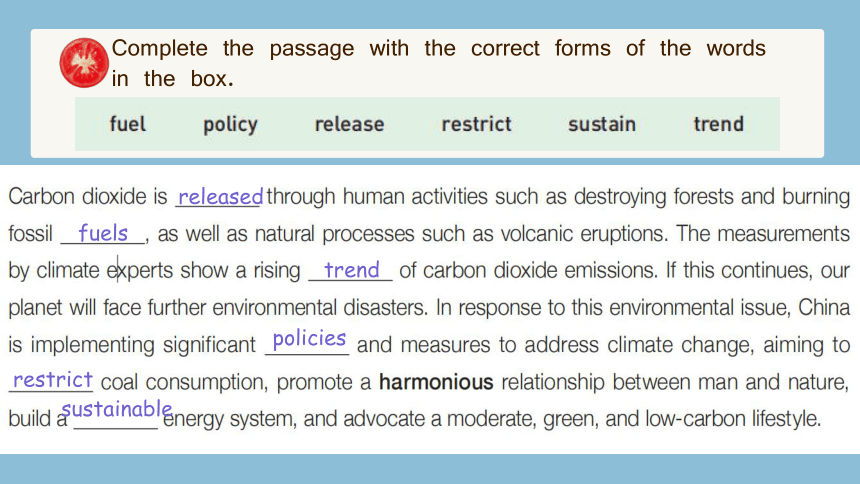

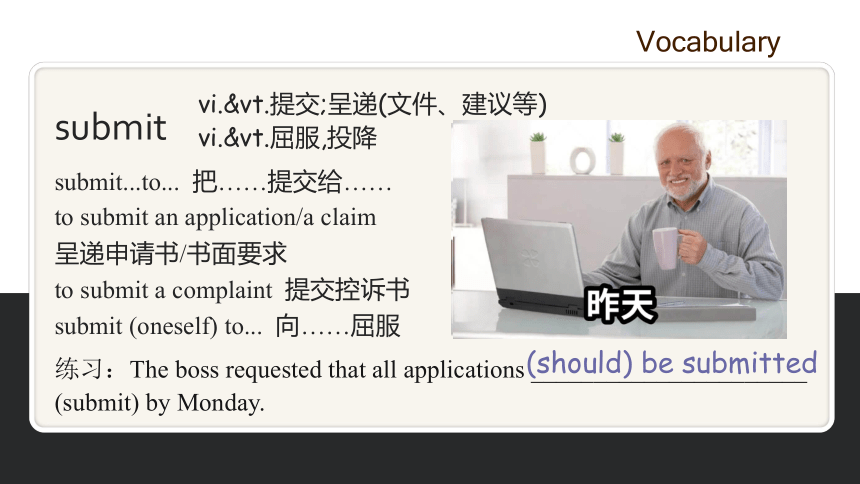
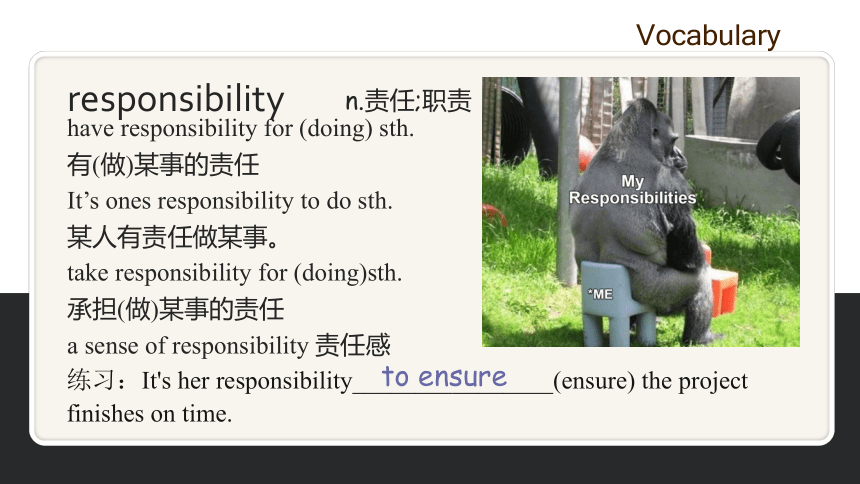
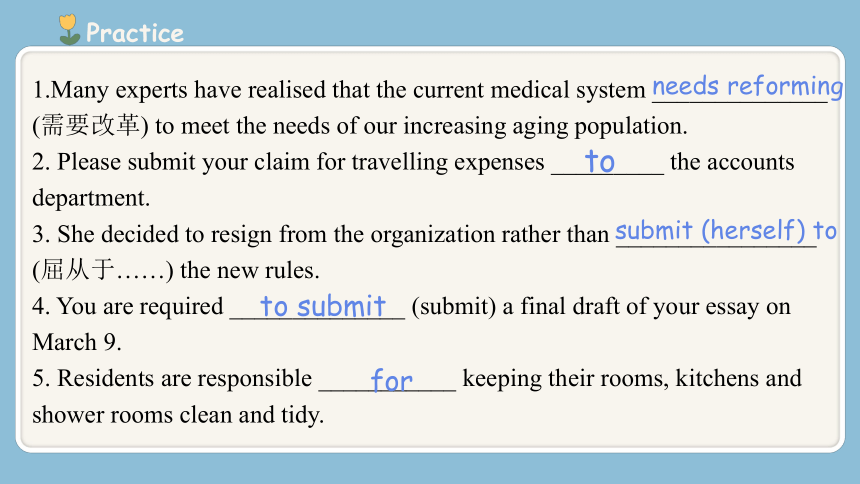

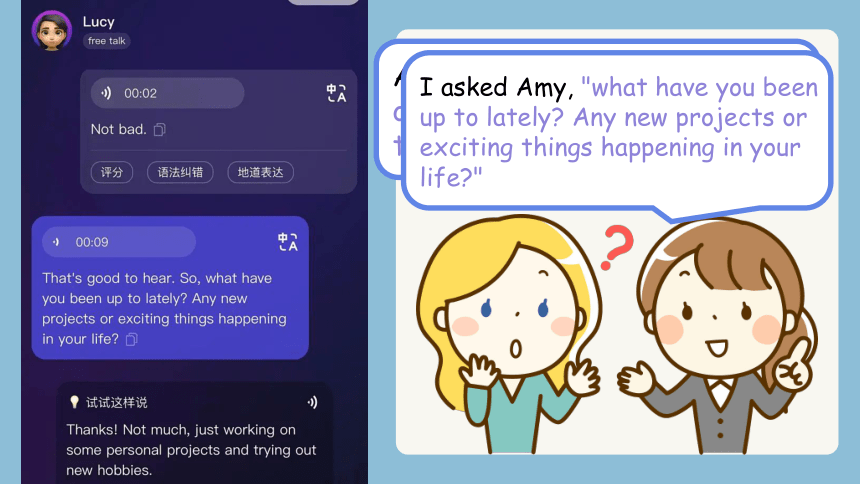

文档简介
(共32张PPT)
Unit 3 Environmental Protection
Learning About Language
Teaching Objectives:
1. Identify and analyse the usages of direct speech and indirect speech.
2. Use indirect speech to express your ideas.
3. Raise the awareness of environmental protection.
Key and difficult points:
Key point:Find out and summarize the rules for changing direct speech into indirect speech and learn to use indirect speech in the context.
Difficult point:How to use indirect speech in real situations.
Part 1 Build up your vocabulary
Complete the sentences with the correct forms of the words in the box.
ecological
starved
comprehensive
broadcasts
seize
Complete the passage with the correct forms of the words in the box.
released
fuels
trend
policies
restrict
sustainable
Vocabulary
reform
a government committed to reform 致力于改革的政府
far-reaching/major reforms 意义深远的/重大的变革
economic reform 经济改革
the reform of the educational system 教育体制的改革
vi.&vt.改革;(使)改正;改造(行为)
n.改革;变革;改良
练习:Our government _________________________________ (致力于改革) for many years.
has been committed to reform
Vocabulary
submit
submit...to... 把……提交给……
to submit an application/a claim
呈递申请书/书面要求
to submit a complaint 提交控诉书
submit (oneself) to... 向……屈服
vi.&vt.提交;呈递(文件、建议等)
vi.&vt.屈服,投降
练习:The boss requested that all applications ______________________ (submit) by Monday.
(should) be submitted
Vocabulary
responsibility
have responsibility for (doing) sth.
有(做)某事的责任
It’s ones responsibility to do sth.
某人有责任做某事。
take responsibility for (doing)sth.
承担(做)某事的责任
a sense of responsibility 责任感
n.责任;职责
练习:It's her responsibility________________(ensure) the project finishes on time.
to ensure
Practice
1.Many experts have realised that the current medical system ______________ (需要改革) to meet the needs of our increasing aging population.
2. Please submit your claim for travelling expenses _________ the accounts department.
3. She decided to resign from the organization rather than ________________ (屈从于……) the new rules.
4. You are required ______________ (submit) a final draft of your essay on March 9.
5. Residents are responsible ___________ keeping their rooms, kitchens and shower rooms clean and tidy.
needs reforming
to
submit (herself) to
to submit
for
Part 2
Direct speech&Indirect speech
Amy said that she was working on some personal projects and trying out new hobbies.
I asked Amy, "what have you been up to lately Any new projects or exciting things happening in your life "
I asked Amy, "what have you been up to lately Any new projects or exciting things happening in your life "
直接引语:直接引述别人的话,把它放在引号内,叫直接引语。
Amy said she was working on some personal projects and trying out new hobbies.
间接引语:用自己的话转述别人的话,叫间接引语。
直接引语变为间接引语时,从句中的人称、时态、指示代词、时间状语和地点状语等一般均要作相应的变化。
直接引语变为间接引语时,人称的变化遵循以下原则。
一随主:直接引语中出现的第一人称代词要按照引述动词的主语的人称变化。
她说她不会沮丧的。
She said, “I get up early every day. ”
She said, "I won't be frustrated."
She said that she wouldn't be frustrated.
直接引语
间接引语
She said she got up early every day.
二随宾:直接引语中出现的第二人称代词要按照引述动词的宾语的人称变化,若引述动词后没有宾语,也可用第一人称。
我告诉玛丽我们会保护她不受感染。
直接引语变为间接引语时,人称的变化遵循以下原则。
I told Mary, "We will protect you from infection."
I told Mary we would protect her from infection.
直接引语
间接引语
She said to Kate, "You did your homework very well"
She said to Kate she had done her homework very well.
第三人称不更新:直接引语出现的第三人称代词一般不需要变化。
她告诉我,他们想减少脂肪的摄入量。
直接引语变为间接引语时,人称的变化遵循以下原则。
She said to me, "They want to decrease the amount of fat they eat."
She told me that they wanted to decrease the amount of fat they ate.
直接引语
间接引语
Amy said, "My mother gave her students a very good speech yesterday."
Amy said her mother had given her students a very good speech the day before.
指示代词的变化:this – that , these—those。
李先生说:“这就是我昨天买的那本书。”
直接引语变为间接引语时,人称的变化遵循以下原则。
Mr. Li said, "This is the book that I bought yesterday."
Mr. Li said that was the book that he had bought the day before.
直接引语
间接引语
Amy said, "My mother gave her students a very good speech yesterday."
Amy said her mother had given her students a very good speech the day before.
在直接引语变为间接引语时,直接引语句中的某些动词也应做相应的变化。
她说艾米那天会去。
动词的变化
"Amy will come today." she said.
She said Amy would go that day.
直接引语
间接引语
Tom said, "I usually go to school at seven."
Tom said she usually went to school at seven.
come→ go
arrive→ leave
bring→ take
她说:"再过五分钟演出就要开始了。"
She said, "The performance will begin in five minutes."
She said (that) the performance would begin in five minutes.
直接引语
She said, "I am very glad to see you."
She said (that) she was very glad to see me.
直接引语如果是陈述句,间接引语应改为由that引导的宾语从句,that可以省去。
直接引语变为间接引语时,句型的变化遵循以下原则。
间接引语
她问我是否对英语感兴趣。
She asked whether I was interested in English.
"Did Amy leave yesterday " she asked.
She asked whether Amy had left the day before.
直接引语为一般疑问句,间接引语用连词whether或if引导,原主句中谓语动词said要改为asked(me/him/us等),语序是陈述句的语序。
直接引语变为间接引语时,句型的变化遵循以下原则。
间接引语
She said, “You are interested in English, aren’t you ”
直接引语
她问我说英语还是法语。
She asked me whether I spoke English or French.
"Do you learn Maths or Physics " she asked.
She asked whether I learn Maths or Physics.
直接引语为选择疑问句,间接引语用whether…or…表达,而不用if…or…,也不用either…or….
直接引语变为间接引语时,句型的变化遵循以下原则。
间接引语
She asked, “Do you speak English or French ”
直接引语
她问我叫什么。
He asked (me) what my name was.
She asked, "How many car factories have been built in your country "
She asked us how many car factories had been built in our country.
直接引语为特殊疑问句,改成间接引语时,原来的疑问词作为间接引语的连词,主句的谓语动词用ask(sb.)来表达,语序改为陈述句语序。
直接引语变为间接引语时,句型的变化遵循以下原则。
间接引语
He asked, "What’s your name "
直接引语
她请我们坐下。
She asked us to be seated.
直接引语为祈使句时,改为间接引语,用带to的不定式表达,谓语动词常是ask, advise, tell, warn, order, request等。如ask sb. to do,(由肯定祈使句变成)ask sb. not to do(由否定祈使句转变),并且在不定式短语中的时间状语、地点状语、人称及时态都作相应的变化。
直接引语变为间接引语时,句型的变化遵循以下原则。
间接引语
She said, "Be seated, please."
直接引语
她建议我们休息一下。
She suggested us having a rest.
有些含有“建议” 、“劝告” 的祈使句,可用suggest, insist, offer等动词转述。
直接引语变为间接引语时,句型的变化遵循以下原则。
间接引语
She said, "Let’s have a rest."
直接引语
She said, "Let me help you."
She offered to help me.
她让我打开门。
She asked me to open the door.
当直接引语形式上是疑问句,有表示请求,建议意义时,可用ask sb. to do sth. /suggest doing/advise sb. to do sth. 等形式转述。
直接引语变为间接引语时,句型的变化遵循以下原则。
间接引语
“Would you mind opening the door ” she asked.
直接引语
She asked us, "Why not going out for a walk "
She advised us to go out for a walk.
她说今天天气真好。
She said what a lovely day it was.
直接引语是感叹句时,变间接引语可用what或how引导,也可用that引导。
直接引语变为间接引语时,句型的变化遵循以下原则。
间接引语
She said, “What a lovely day it is!”
直接引语
Part 3 Practice
Guess who students are talking to and then change the sentences into indirect speech.
Name Statements/Questions
Daine “What made Hurricane Katrina unusual ”
“Was it the worst natural disaster in American history ”
Martha “I want to become a scientist and help the world.”
“I’m doing a project on behalf of my school about global warming.”
Bob “Why is nuclear power a sensitive topic ”
“Could you explain how the nuclear disaster happened ”
Laura “How many animals have disappeared because of human hunting ”
“What can we do to help wild animals ”
Vincent “I’ve never been to the Amazon Jungle.”
“Will scientists discover new species there ”
Name Statements/Questions
Daine Daine asked what had made Hurricane Katrina unusual
Daine asked if/ whether it had been the worst natural disaster in American history
Martha Martha said/told me that she want to become a scientist and help the world.
Martha said/told me that she was doing a project on behalf of my school about global warming.
Bob Bob asked why nuclear power was a sensitive topic
Bob asked if/whether they could explain how the nuclear disaster had happened
Laura Laura asked how many animals had disappeared because of human hunting
Laura asked what we could do to help wild animals
Vincent Vincent said/told me that he had never been to the Amazon Jungle.
Vincent asked if/whether scientists would discover new species there
完成句子
1. “I will come and see you again this evening, Tom , ”she said.
→She told Tom that _______would go and see _______again that evening.
2. He said to me, “You are wrong.”
→ He told me that _______ was wrong.
3. The teacher said, “You are doing OK. ”
→The teacher said that _______ _______doing OK.
4. She said, “Do you like watching the advertisements on TV ”
→She asked me ________________ I ________ watching the advertisements on TV.
5. He said, “Don't make so much noise, boys. ”
→ He told the boys _________ _________ _________so much noise.
she
him
I
I was
whether/if
liked
not to make
完成句子
1. "Are you a soldier " she asked.
→She asked if/whether _______was a soldier.
2. She asked, “Where are you going to get off, John ”
→ She asked John where _______ was going to get off.
3. “I will come here again today,” she said.
→She said that _______ would go there again that day.
4. She said, "I am living with my cousin."
→She said that ________ was living with ________ cousin.
5. She said, “Amy will come here to have a long holiday.”
→She said that _________ _________ go there to have a long holiday.
I
he
she
she
her
she would
SEE YOU NEXT TIME
Unit 3 Environmental Protection
Learning About Language
Teaching Objectives:
1. Identify and analyse the usages of direct speech and indirect speech.
2. Use indirect speech to express your ideas.
3. Raise the awareness of environmental protection.
Key and difficult points:
Key point:Find out and summarize the rules for changing direct speech into indirect speech and learn to use indirect speech in the context.
Difficult point:How to use indirect speech in real situations.
Part 1 Build up your vocabulary
Complete the sentences with the correct forms of the words in the box.
ecological
starved
comprehensive
broadcasts
seize
Complete the passage with the correct forms of the words in the box.
released
fuels
trend
policies
restrict
sustainable
Vocabulary
reform
a government committed to reform 致力于改革的政府
far-reaching/major reforms 意义深远的/重大的变革
economic reform 经济改革
the reform of the educational system 教育体制的改革
vi.&vt.改革;(使)改正;改造(行为)
n.改革;变革;改良
练习:Our government _________________________________ (致力于改革) for many years.
has been committed to reform
Vocabulary
submit
submit...to... 把……提交给……
to submit an application/a claim
呈递申请书/书面要求
to submit a complaint 提交控诉书
submit (oneself) to... 向……屈服
vi.&vt.提交;呈递(文件、建议等)
vi.&vt.屈服,投降
练习:The boss requested that all applications ______________________ (submit) by Monday.
(should) be submitted
Vocabulary
responsibility
have responsibility for (doing) sth.
有(做)某事的责任
It’s ones responsibility to do sth.
某人有责任做某事。
take responsibility for (doing)sth.
承担(做)某事的责任
a sense of responsibility 责任感
n.责任;职责
练习:It's her responsibility________________(ensure) the project finishes on time.
to ensure
Practice
1.Many experts have realised that the current medical system ______________ (需要改革) to meet the needs of our increasing aging population.
2. Please submit your claim for travelling expenses _________ the accounts department.
3. She decided to resign from the organization rather than ________________ (屈从于……) the new rules.
4. You are required ______________ (submit) a final draft of your essay on March 9.
5. Residents are responsible ___________ keeping their rooms, kitchens and shower rooms clean and tidy.
needs reforming
to
submit (herself) to
to submit
for
Part 2
Direct speech&Indirect speech
Amy said that she was working on some personal projects and trying out new hobbies.
I asked Amy, "what have you been up to lately Any new projects or exciting things happening in your life "
I asked Amy, "what have you been up to lately Any new projects or exciting things happening in your life "
直接引语:直接引述别人的话,把它放在引号内,叫直接引语。
Amy said she was working on some personal projects and trying out new hobbies.
间接引语:用自己的话转述别人的话,叫间接引语。
直接引语变为间接引语时,从句中的人称、时态、指示代词、时间状语和地点状语等一般均要作相应的变化。
直接引语变为间接引语时,人称的变化遵循以下原则。
一随主:直接引语中出现的第一人称代词要按照引述动词的主语的人称变化。
她说她不会沮丧的。
She said, “I get up early every day. ”
She said, "I won't be frustrated."
She said that she wouldn't be frustrated.
直接引语
间接引语
She said she got up early every day.
二随宾:直接引语中出现的第二人称代词要按照引述动词的宾语的人称变化,若引述动词后没有宾语,也可用第一人称。
我告诉玛丽我们会保护她不受感染。
直接引语变为间接引语时,人称的变化遵循以下原则。
I told Mary, "We will protect you from infection."
I told Mary we would protect her from infection.
直接引语
间接引语
She said to Kate, "You did your homework very well"
She said to Kate she had done her homework very well.
第三人称不更新:直接引语出现的第三人称代词一般不需要变化。
她告诉我,他们想减少脂肪的摄入量。
直接引语变为间接引语时,人称的变化遵循以下原则。
She said to me, "They want to decrease the amount of fat they eat."
She told me that they wanted to decrease the amount of fat they ate.
直接引语
间接引语
Amy said, "My mother gave her students a very good speech yesterday."
Amy said her mother had given her students a very good speech the day before.
指示代词的变化:this – that , these—those。
李先生说:“这就是我昨天买的那本书。”
直接引语变为间接引语时,人称的变化遵循以下原则。
Mr. Li said, "This is the book that I bought yesterday."
Mr. Li said that was the book that he had bought the day before.
直接引语
间接引语
Amy said, "My mother gave her students a very good speech yesterday."
Amy said her mother had given her students a very good speech the day before.
在直接引语变为间接引语时,直接引语句中的某些动词也应做相应的变化。
她说艾米那天会去。
动词的变化
"Amy will come today." she said.
She said Amy would go that day.
直接引语
间接引语
Tom said, "I usually go to school at seven."
Tom said she usually went to school at seven.
come→ go
arrive→ leave
bring→ take
她说:"再过五分钟演出就要开始了。"
She said, "The performance will begin in five minutes."
She said (that) the performance would begin in five minutes.
直接引语
She said, "I am very glad to see you."
She said (that) she was very glad to see me.
直接引语如果是陈述句,间接引语应改为由that引导的宾语从句,that可以省去。
直接引语变为间接引语时,句型的变化遵循以下原则。
间接引语
她问我是否对英语感兴趣。
She asked whether I was interested in English.
"Did Amy leave yesterday " she asked.
She asked whether Amy had left the day before.
直接引语为一般疑问句,间接引语用连词whether或if引导,原主句中谓语动词said要改为asked(me/him/us等),语序是陈述句的语序。
直接引语变为间接引语时,句型的变化遵循以下原则。
间接引语
She said, “You are interested in English, aren’t you ”
直接引语
她问我说英语还是法语。
She asked me whether I spoke English or French.
"Do you learn Maths or Physics " she asked.
She asked whether I learn Maths or Physics.
直接引语为选择疑问句,间接引语用whether…or…表达,而不用if…or…,也不用either…or….
直接引语变为间接引语时,句型的变化遵循以下原则。
间接引语
She asked, “Do you speak English or French ”
直接引语
她问我叫什么。
He asked (me) what my name was.
She asked, "How many car factories have been built in your country "
She asked us how many car factories had been built in our country.
直接引语为特殊疑问句,改成间接引语时,原来的疑问词作为间接引语的连词,主句的谓语动词用ask(sb.)来表达,语序改为陈述句语序。
直接引语变为间接引语时,句型的变化遵循以下原则。
间接引语
He asked, "What’s your name "
直接引语
她请我们坐下。
She asked us to be seated.
直接引语为祈使句时,改为间接引语,用带to的不定式表达,谓语动词常是ask, advise, tell, warn, order, request等。如ask sb. to do,(由肯定祈使句变成)ask sb. not to do(由否定祈使句转变),并且在不定式短语中的时间状语、地点状语、人称及时态都作相应的变化。
直接引语变为间接引语时,句型的变化遵循以下原则。
间接引语
She said, "Be seated, please."
直接引语
她建议我们休息一下。
She suggested us having a rest.
有些含有“建议” 、“劝告” 的祈使句,可用suggest, insist, offer等动词转述。
直接引语变为间接引语时,句型的变化遵循以下原则。
间接引语
She said, "Let’s have a rest."
直接引语
She said, "Let me help you."
She offered to help me.
她让我打开门。
She asked me to open the door.
当直接引语形式上是疑问句,有表示请求,建议意义时,可用ask sb. to do sth. /suggest doing/advise sb. to do sth. 等形式转述。
直接引语变为间接引语时,句型的变化遵循以下原则。
间接引语
“Would you mind opening the door ” she asked.
直接引语
She asked us, "Why not going out for a walk "
She advised us to go out for a walk.
她说今天天气真好。
She said what a lovely day it was.
直接引语是感叹句时,变间接引语可用what或how引导,也可用that引导。
直接引语变为间接引语时,句型的变化遵循以下原则。
间接引语
She said, “What a lovely day it is!”
直接引语
Part 3 Practice
Guess who students are talking to and then change the sentences into indirect speech.
Name Statements/Questions
Daine “What made Hurricane Katrina unusual ”
“Was it the worst natural disaster in American history ”
Martha “I want to become a scientist and help the world.”
“I’m doing a project on behalf of my school about global warming.”
Bob “Why is nuclear power a sensitive topic ”
“Could you explain how the nuclear disaster happened ”
Laura “How many animals have disappeared because of human hunting ”
“What can we do to help wild animals ”
Vincent “I’ve never been to the Amazon Jungle.”
“Will scientists discover new species there ”
Name Statements/Questions
Daine Daine asked what had made Hurricane Katrina unusual
Daine asked if/ whether it had been the worst natural disaster in American history
Martha Martha said/told me that she want to become a scientist and help the world.
Martha said/told me that she was doing a project on behalf of my school about global warming.
Bob Bob asked why nuclear power was a sensitive topic
Bob asked if/whether they could explain how the nuclear disaster had happened
Laura Laura asked how many animals had disappeared because of human hunting
Laura asked what we could do to help wild animals
Vincent Vincent said/told me that he had never been to the Amazon Jungle.
Vincent asked if/whether scientists would discover new species there
完成句子
1. “I will come and see you again this evening, Tom , ”she said.
→She told Tom that _______would go and see _______again that evening.
2. He said to me, “You are wrong.”
→ He told me that _______ was wrong.
3. The teacher said, “You are doing OK. ”
→The teacher said that _______ _______doing OK.
4. She said, “Do you like watching the advertisements on TV ”
→She asked me ________________ I ________ watching the advertisements on TV.
5. He said, “Don't make so much noise, boys. ”
→ He told the boys _________ _________ _________so much noise.
she
him
I
I was
whether/if
liked
not to make
完成句子
1. "Are you a soldier " she asked.
→She asked if/whether _______was a soldier.
2. She asked, “Where are you going to get off, John ”
→ She asked John where _______ was going to get off.
3. “I will come here again today,” she said.
→She said that _______ would go there again that day.
4. She said, "I am living with my cousin."
→She said that ________ was living with ________ cousin.
5. She said, “Amy will come here to have a long holiday.”
→She said that _________ _________ go there to have a long holiday.
I
he
she
she
her
she would
SEE YOU NEXT TIME
